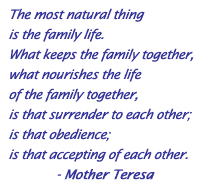All you have to do is read the part where Jesus talks about unconditional love in the expression "a new commandment I give you, love one another as I have loved you." And following that practice of teaching unconditional love, he made the ultimate sacrifice of complete unconditional love by dying on the cross for each one of us.
 Being generous whether you are married, single or in the priesthood, is a quality that adds to your happiness, helps you feel good when you helped someone. We all know without simplifying too much, it is better to be a giver than a taker. And we all know that there are too many takers in the world and in our own lives. Being generous whether you are married, single or in the priesthood, is a quality that adds to your happiness, helps you feel good when you helped someone. We all know without simplifying too much, it is better to be a giver than a taker. And we all know that there are too many takers in the world and in our own lives.
Being generous can often lead to a lot of frustration. How often have you helped people in your life, did everything you could for them and you never hear from them for a long time. They turn up in your life when they want something. How often the expression, "what have you done for me lately" is spoken by people who always expect things to be done for them. They expect to receive generosity yet never reciprocate other than with a few muffled words of thanks. What has happened to the thing we call gratitude?
The greatest kind of love and generosity one can give is that which is given without any expectation of return. That is the kind of love Christ showed. And this is what we have to imitate if we are to become more Christ-like or more like Christ.
Our standard of generosity and love has to be based on that of Christ. But oftentimes the more generous we are the more frustrated we become in our relationship with those who are takers.
Love, as taught by Christ and imitated by us, can be quite painful, I am sure when Christ had to take a cord of whips into the place he called sacred, namely the temple, and drive the merchants and friends out of the temple, it had to hurt him as much as those who were there. This is the first example we have of what we call "tough love."
And tough love is painful on the part of the one who administers it, not just on the part of those who receive it. Tough love oftentimes has to be used by parents for the sake of the common good of the family in order to keep peace and serenity in a family. Tough love oftentimes is the only way control can be maintained. No parent in his right mind wants to lay down laws and rules and regulations. But he has to. If order is to prevail, teenagers growing up because of the influence of their peers and friends, generally think parents are out of it. If parents, when they are exercising tough love, if they don't say the right words, if they don't use the right expression, that's the loophole teenagers look for to justify a behavior that is almost opposite to the thoughts of the parents.
 Teenagers in all generations make the same mistake when they say to their parents, well all the other kids are staying out later than I am. And a lot of their parents don't mind when their children come home. Teenagers in all generations make the same mistake when they say to their parents, well all the other kids are staying out later than I am. And a lot of their parents don't mind when their children come home.
Tough love is necessary for teenagers and children. Unconditional love for teenagers does not include tough love. Christ used tough love in the temple when he drove out the money changers. He also used unconditional love for everyone when he sacrificed his life on the cross.
The question of how much love you give is not an easy one. We know Christ said love one another, and when this is done towards the right people you feel wonderful. When that same love is given to the wrong people, you feel used and frustrated.
Tough love, unconditional love, who you give love to often times becomes quite complicated. There is no quality that is more powerful than that of love. Family members, whether parents or children, desire to love one another despite the imperfections they see in each other.
In every family, whether your are a teenager or a parent, there is always the opportunity to show unconditional love on the part of parents to teenagers, teenagers to parents. In the final analysis, the family that has each member showing unconditional love to one another, that is the family that is imitating the words of Christ. Love one another as I have loved you. In a family where love and generosity reign there will be a family at peace.
back to top
| Print this page
|



